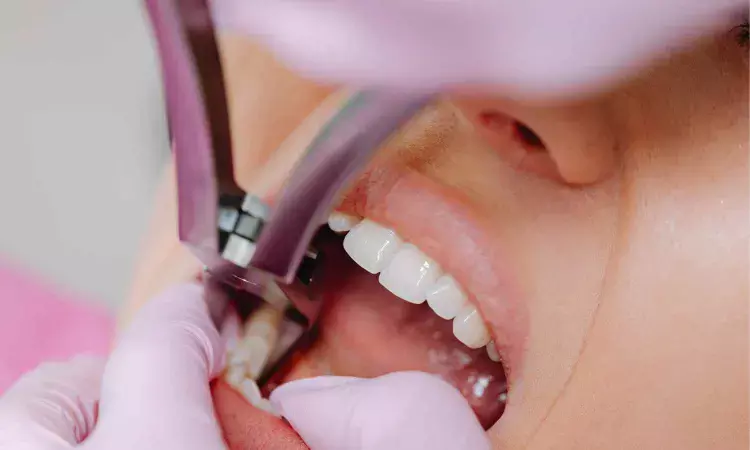- Home
- Medical news & Guidelines
- Anesthesiology
- Cardiology and CTVS
- Critical Care
- Dentistry
- Dermatology
- Diabetes and Endocrinology
- ENT
- Gastroenterology
- Medicine
- Nephrology
- Neurology
- Obstretics-Gynaecology
- Oncology
- Ophthalmology
- Orthopaedics
- Pediatrics-Neonatology
- Psychiatry
- Pulmonology
- Radiology
- Surgery
- Urology
- Laboratory Medicine
- Diet
- Nursing
- Paramedical
- Physiotherapy
- Health news
- Fact Check
- Bone Health Fact Check
- Brain Health Fact Check
- Cancer Related Fact Check
- Child Care Fact Check
- Dental and oral health fact check
- Diabetes and metabolic health fact check
- Diet and Nutrition Fact Check
- Eye and ENT Care Fact Check
- Fitness fact check
- Gut health fact check
- Heart health fact check
- Kidney health fact check
- Medical education fact check
- Men's health fact check
- Respiratory fact check
- Skin and hair care fact check
- Vaccine and Immunization fact check
- Women's health fact check
- AYUSH
- State News
- Andaman and Nicobar Islands
- Andhra Pradesh
- Arunachal Pradesh
- Assam
- Bihar
- Chandigarh
- Chattisgarh
- Dadra and Nagar Haveli
- Daman and Diu
- Delhi
- Goa
- Gujarat
- Haryana
- Himachal Pradesh
- Jammu & Kashmir
- Jharkhand
- Karnataka
- Kerala
- Ladakh
- Lakshadweep
- Madhya Pradesh
- Maharashtra
- Manipur
- Meghalaya
- Mizoram
- Nagaland
- Odisha
- Puducherry
- Punjab
- Rajasthan
- Sikkim
- Tamil Nadu
- Telangana
- Tripura
- Uttar Pradesh
- Uttrakhand
- West Bengal
- Medical Education
- Industry
Risk of bleeding after dental extractions rather low among patients on antiplatelet therapy, suggests study

A study published in BMC Oral Health suggests that the risk of bleeding after dental extractions is rather low among patients on antiplatelet therapy.
This retrospective study aimed to identify high-risk dental extraction patients and the timing of postoperative haemorrhage to evaluate whether preventive hospitalization should be considered in patients on antiplatelet medication (AP) or anticoagulants.
The study included 1595 procedures; 1319 were conducted under monotherapy (Group I: AP; Group II: indirect oral anticoagulant [IAC]; Group III: direct oral anticoagulant [DOAC]) and 276 under dual therapy (Group IV: double AP; Group V: AP and IAC; Group VI: AP and DOAC).
We evaluated the incidence, frequency and timing of haemorrhage, hospitalization rate, and treatment of bleeding incidents.
Results: The incidence of hemorrhagic events was significantly higher in the dual therapy groups compared to the monotherapy groups (p < 0.001). Comparing the procedures under monotherapy, those on DOAC (Group III) had a significantly higher risk of postoperative bleeding than Groups I and II (p < 0.001) and a higher rate of repeated bleeding episodes (p = 0.035).
Regarding bleeding incidents, 44% (dual therapy) vs. 51.1% (monotherapy) occurred on the day of surgery. The bleeding risk after dental extractions is overall low and patients were often hospitalized preventively due to their comorbidities rather than actual bleeding risk. Patients should be instructed about local compression, and surgeries should be completed in the morning to avoid emergency visits. However, patients with cardiovascular diseases and dual therapy had a higher risk of postoperative haemorrhage. Thus, hospitalization is to be considered in these cases.
Reference:
Katz, M.S., Benidamou, R., Ooms, M. et al. Influence of antiplatelet medication and anticoagulation therapy after dental extractions on hospitalization: a retrospective 10-year study. BMC Oral Health 24, 1485 (2024). https://doi.org/10.1186/s12903-024-05275-6
Dr. Shravani Dali has completed her BDS from Pravara institute of medical sciences, loni. Following which she extensively worked in the healthcare sector for 2+ years. She has been actively involved in writing blogs in field of health and wellness. Currently she is pursuing her Masters of public health-health administration from Tata institute of social sciences. She can be contacted at editorial@medicaldialogues.in.
Dr Kamal Kant Kohli-MBBS, DTCD- a chest specialist with more than 30 years of practice and a flair for writing clinical articles, Dr Kamal Kant Kohli joined Medical Dialogues as a Chief Editor of Medical News. Besides writing articles, as an editor, he proofreads and verifies all the medical content published on Medical Dialogues including those coming from journals, studies,medical conferences,guidelines etc. Email: drkohli@medicaldialogues.in. Contact no. 011-43720751


